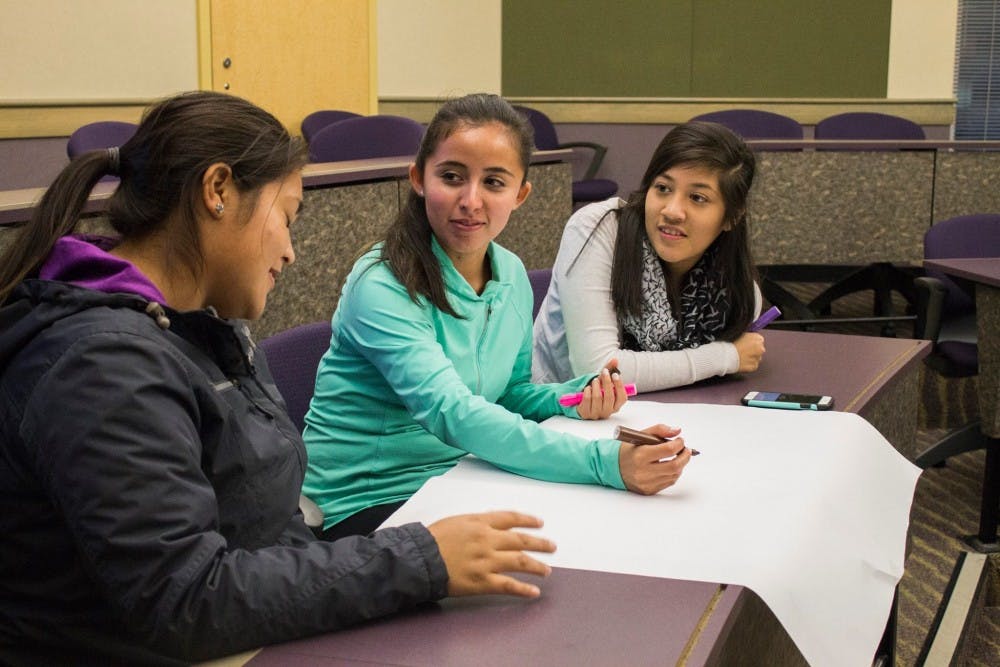by Melissa Aguilar |
Cassandra Kasten-Arias’ mother had to work long days on the farm and would talk about how difficult it was to focus on her studies growing up, while also trying to work to support her family. Because of those barriers, her mother never completed high school.
Though Kasten-Arias’ father graduated from Oregon State University, neither of her parents could help with the logistics when it came time for her to apply to college.
But their support, as well as the help of other figures in her life, helped the junior biology and Spanish major on her path to higher education. They also inspired Kasten-Arias to become a co-coordinator of UP’s Chicano Mentoring Program.
“I think maybe part of (my motivation to mentor) is I feel this pressure to give back,” Kasten- Arias said. “Because I’m receiving this help and so I really want people to get as much help as they need.
“Chicano” has generally been used to identify Mexican-Americans, particularly by civil rights activists like Cesar Chavez.
“To me, I think it can expand to all Latino ethnicities and I think it’s especially important now with everything that’s going on with undocumented people and how they’re being mistreated,” Kasten-Arias said. “And some politicians … just don’t understand that these people are human and they don’t understand their backgrounds.”
Even though the number of Hispanics on college campuses has seen a 201 percent increase in the last 20 years, only 15 percent of Hispanics aged 25 to 29 have a bachelor’s degree or higher, according to Pew Research Center.
UP alumna Karina Hernandez Gallo (‘15), along with students from Portland State University and Portland Community College saw the demand to help Chicano students get to college and be successful.
Their vision was to start a mentoring program through which Latinos in graduate school or working professionally could mentor college students, who could mentor high school students and so on.
Though the college students began laying the groundwork for the program in the fall of 2015, it was not until the spring of this year that college mentors met with high school mentees for the first time.
Since Hernandez Gallo graduated last May, she left the program in the hands of several UP co-coordinators, one of whom is Kasten-Arias.
“Coming from a Latino background, I see this demand as well,” Kasten-Arias said. “We’re helping Latino high school students that don’t have parents that have gone through college or don’t have older siblings that have gone through it. So it can be really hard.”
Kasten-Arias started her undergraduate career at Linfield College, where she was mentored by an older Latino student, while also serving as a mentor for middle school students from lower socioeconomic backgrounds.
Because of her experience mentoring at Linfield, Kasten-Arias suggested that UP’s Chicano Mentoring Program reach out to the counselors at Roosevelt High School to help find the students who could benefit from the program the most.
Laurel Auda Capel, one of two bilingual counselors at Roosevelt, met with the group of UP students last spring to discuss their goals and helped recruit high school students for the program.
“Working at a low-income school where most of my students are going to be first generation in their family to go to college, it’s so important to them to have evidence of (the idea that), ‘It’s hard but it happens,’” Auda Capel said. “And here’s some people who are going through the experience currently and make it work and they’re models of that.”
About 20 UP mentors are paired with 25 mentees for personalized meetings twice a month. Mentees took a questionnaire that asked questions about career interests and potential fields of study in college. Mentors took a similar survey to match them with the right mentee.
Though the mentors have only met with their mentees a few times so far this semester, they hope the program will continue to grow.
Auda Capel said UP students quickly started relationship-building at the group’s meet and greet event, where mentees and mentors were able to speak to each other for the first time.
“Right after that meeting, several kids came up to me actually and said, ‘When am I going to meet with that mentor again?’” Auda Capel said. “Which is great … that they were excited about those relationships.”
Melissa Aguilar is copy editor for The Beacon. She can be reached at aguilarm16@up.edu.








